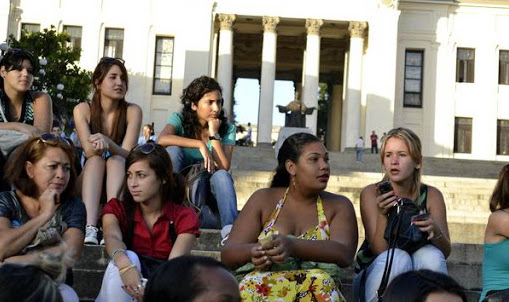At the home of 17-year-old Ismaray Zaldívar spats had become a daily occurrence since last September 9, when the authorities at the Ministry of Higher Education (MES) announced the start of the entrance exams for the 2021 school year.
Her parents were unable to convince her to follow the family's original plan: study for a Bachelor of Architecture degree in college, like her father and grandfather.
"Being a college student will no longer be something exceptional. Now anyone can go, regardless of their grade average or class rank. It is quite disheartening when you have a vocation for study, and make the effort to excel, and then those who do not have the least interest or commitment have the same access as you do," complained Zaldívar in reference to recent news regarding the availability of university studies.
The MES authorities announced that all students who complete the 12th grade are guaranteed this year - at least numerically – slots in higher education, and that passing the entrance exams will not be essential, since all university study options will be able to the full spectrum of students.
"Those who passed will have priority", stressed the Ministry's director of Income and Labor Placement, René Sánchez Díaz, "followed by those who did not, but there will be openings for those who did not take the entrance tests."
Relatives, students and academics have slammed these decisions made by the MES, which they classify as a give-away of positions that will massify the university system.
"Where is the reward for all the effort, for the dedication, for the sacrifice of studying?" asked María de los Ángeles Montoto, the mother of a young woman who was also disappointed to learn that she had wasted five months of study and personal preparation.
"I don't want to get dramatic, but my daughter Laurita is really depressed. She spent months preparing for the college entrance exams. She gave up other things in order to study and achieve her goal of ultimately graduating from college, and now it turns out that you don't even have to take those exams to get in. How is it possible that those who have studied hard and those who haven't will have the same access rights? What message is being sent to young people with a decision like this?" asks Montoto.
Without learning from its own failures, the Cuban regime insists on its misguided policy of massification. The undeniable decline in the professional level of university graduates on the island is the consequence of a political approach based on training professionals not based on vocation, or achievement, but en masse. Emerging programs in Medicine, Pedagogy, Art and Social Work offer some examples.
In the opinion of the young scholar José Raúl Gallego, "the right to universal and free access cannot be confused with eliminating the principles of selection on the basis of the capacities and abilities that students who choose university studies must have developed."
This improvisation by the regime will endanger the professional community of tomorrow, Gallego explains, as "giving away slots" marks a harmful precedent in many aspects.
"In many Cuban university degree programs there is a tendency to pass everyone, as pass rates are indicator for their evaluation. This means that many of those young people who today are accepted, without even having taken the entrance exams, may go on to graduate, which will have consequences not only within universities, but in society as well."
Looking to the future, the young academic states that "we should look at what study programs will be offered to those students who did not take, or failed, the entrance exams, so they are at the bottom of the lists. If the trend from previous years continues, they may be pedagogical studies. This means that students who did not even meet the minimum entry requirements for higher education will end up becoming the teachers of tomorrow's students."
"It is true that the country went through an atypical situation, which attacked teaching and preparation for entrance exams, but I don't think that this is the right solution," adds Gallego.
Adolescents, rather than embracing the triumphalism that this decision of the MES encourages, are just apathetic towards study. Students will not be motivated to study as long as, regardless of their perseverance or class standing, they are assured access to higher education.
"Taking this path, we’ll all be lousy university students," agrees Gabriel Argüelles, another young man who invested a lot of time preparing for entrance exams, in his case, in Art History.
"The fact that education in Cuba is free should not mean that everyone can be a university student. This should not be interpreted as a way of excluding people, but just a question of common sense: not all people have the ability or talent for higher education, just as not all people who play sports can be elite athletes. I believe that this MES measure is a mistake, and I really hope that it will be rectified, because our country's professional future is at stake," Argüelles concluded.

There are two main goals in Castrocuban education; to serve dictatorship’s domestic purposes, and to provide a hard currency source of income for the Castros’ profit, like the enslaved medics export program.